外研版八年级英语上册课件 Module 12 Help Unit 1 (共16张PPT)
文档属性
| 名称 | 外研版八年级英语上册课件 Module 12 Help Unit 1 (共16张PPT) | 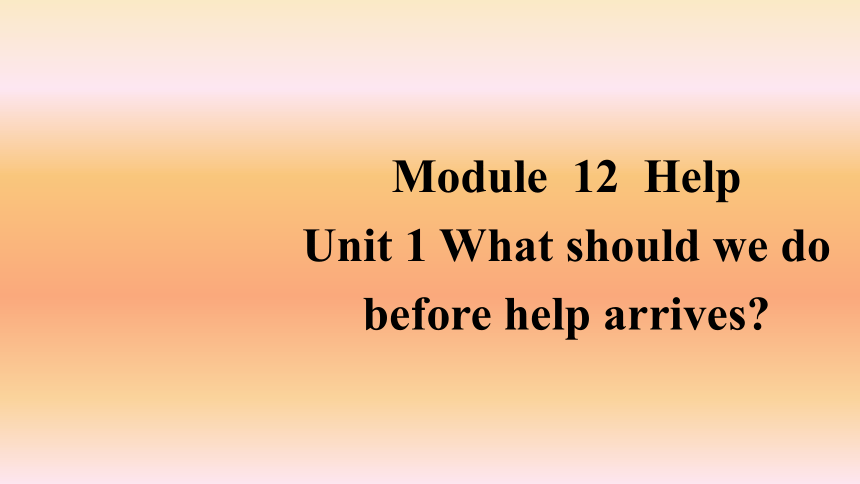 | |
| 格式 | pptx | ||
| 文件大小 | 3.8MB | ||
| 资源类型 | 教案 | ||
| 版本资源 | 外研版 | ||
| 科目 | 英语 | ||
| 更新时间 | 2022-08-03 15:05:10 | ||
图片预览

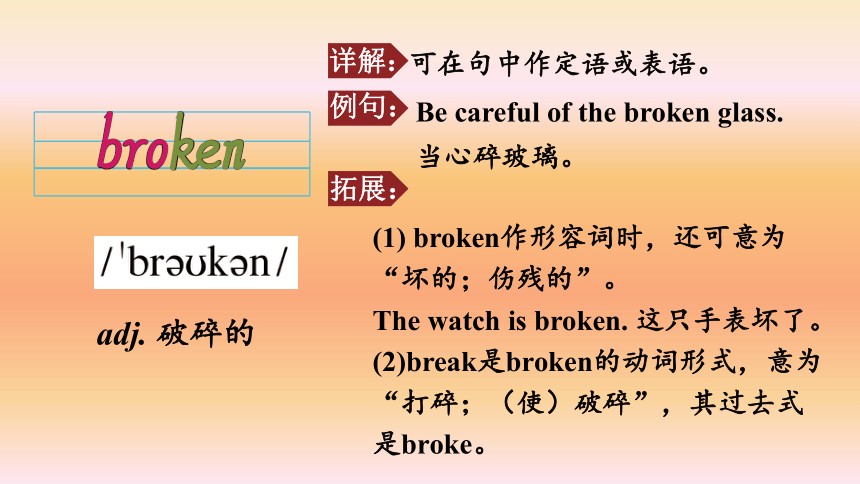
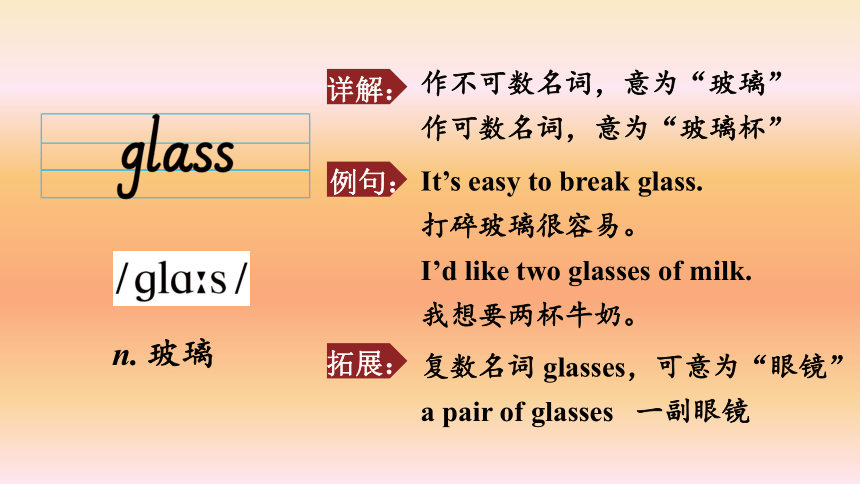
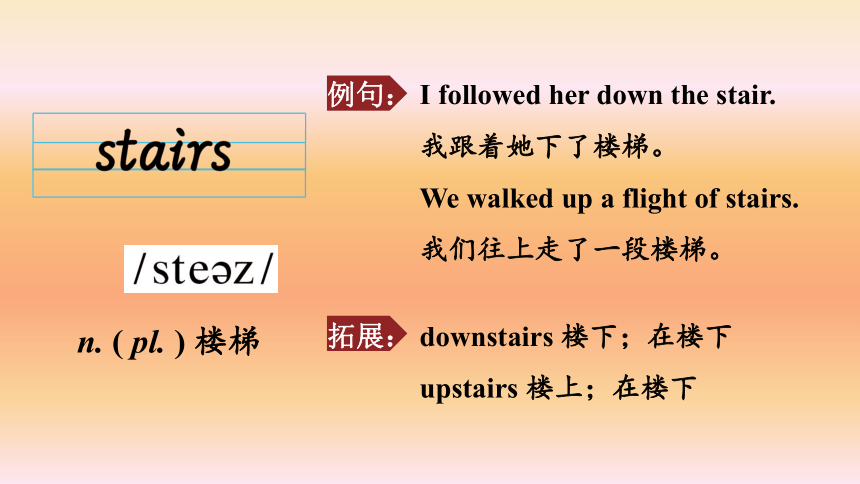
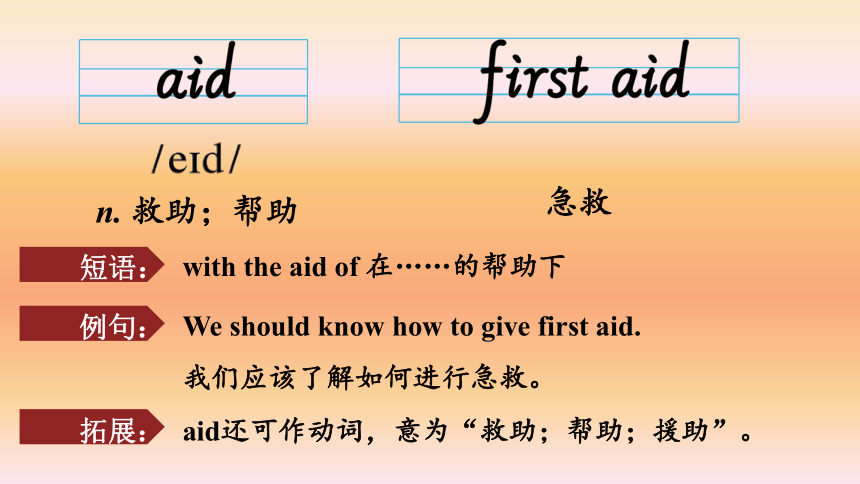
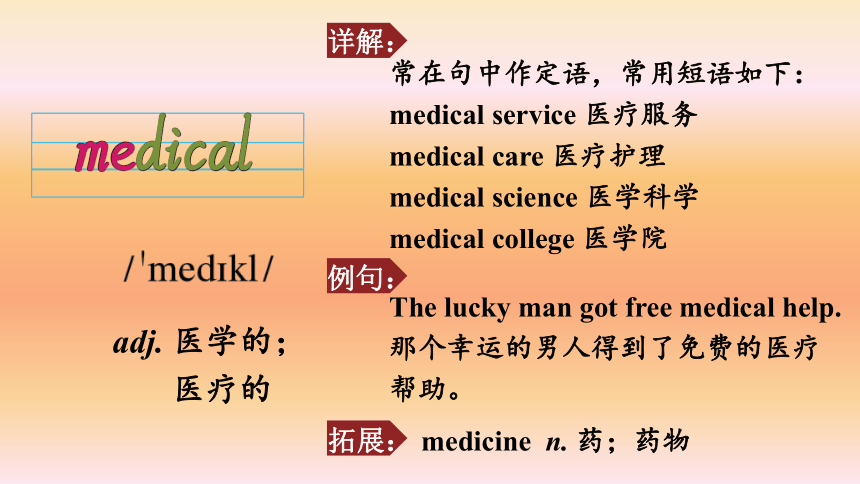
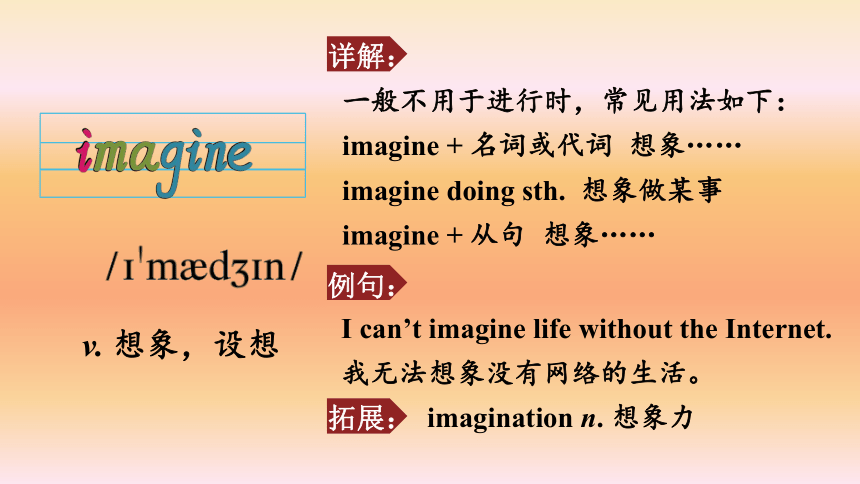
文档简介
(共16张PPT)
Module 12 Help
Unit 1 What should we do before help arrives
adj. 破碎的
详解:
拓展:
例句:
Be careful of the broken glass. 当心碎玻璃。
可在句中作定语或表语。
(1) broken作形容词时,还可意为“坏的;伤残的”。
The watch is broken. 这只手表坏了。
(2)break是broken的动词形式,意为“打碎;(使)破碎”,其过去式是broke。
n. 玻璃
详解:
拓展:
例句:
It’s easy to break glass.
打碎玻璃很容易。
I’d like two glasses of milk.
我想要两杯牛奶。
作不可数名词,意为“玻璃”
作可数名词,意为“玻璃杯”
复数名词 glasses,可意为“眼镜”
a pair of glasses 一副眼镜
n. ( pl. ) 楼梯
I followed her down the stair.
我跟着她下了楼梯。
We walked up a flight of stairs.
我们往上走了一段楼梯。
downstairs 楼下;在楼下
upstairs 楼上;在楼下
拓展:
例句:
n. 救助;帮助
急救
例句:
We should know how to give first aid.
我们应该了解如何进行急救。
短语:
with the aid of 在……的帮助下
拓展:
aid还可作动词,意为“救助;帮助;援助”。
adj. 医学的;
医疗的
详解:
拓展:
例句:
The lucky man got free medical help. 那个幸运的男人得到了免费的医疗帮助。
常在句中作定语,常用短语如下:
medical service 医疗服务
medical care 医疗护理
medical science 医学科学
medical college 医学院
medicine n. 药;药物
v. 想象,设想
详解:
拓展:
例句:
I can’t imagine life without the Internet. 我无法想象没有网络的生活。
一般不用于进行时,常见用法如下:
imagine + 名词或代词 想象……
imagine doing sth. 想象做某事
imagine + 从句 想象……
imagination n. 想象力
n. 底部;下端
在……的底部
反义短语为 at the top of, 意为“在……的顶部”
I waited for them at the bottom of the hill.
我在山脚下等他们。
at the bottom of one’s heart 在某人内心里
例句:
详解:
拓展:
adj. 有毛病的;
错误的
adv. 不正确地;
错误地
句型:
例句:
There is something wrong with my computer. 我的电脑出了问题。
Don’t spell the words wrong.
不要拼错单词。
What’s wrong with… 意为“……怎么了?”,常用于询问某人或某物怎么了或出了什么状况。“What’s wrong ”也可单独使用。
n. 问题;烦恼;困难
详解:
例句:
Bill has trouble with his homework. 比尔做家庭作业有困难。
作不可数名词,常用短语如下:
get into trouble 遇上麻烦
be in trouble 处于困境
have trouble with sth. 在……方面有困难
have trouble (in) doing sth. 做某事有困难
拓展:
trouble还可作动词,意为“使苦恼;打扰”。
n. 电梯
v.举起;抬起;提起
例句:
He is strong enough to lift up the box. 他足够强壮,能举起这个箱子。
抬起;提起
拓展:
lift还可作名词,意为“电梯;搭便车”。 give sb. a lift 让某人搭便车take the lift 乘电梯
详解:
lift及物动词,lift up意为“抬起;提起”,是“动词+副词”型短语。
adj. 有害的
The air pollution is harmful to our health. 空气污染对我们的健康有害。
harm n. 意为“伤害;损害”。
do harm to = be harmful to
由“harm(n.)+ -ful(形容词后缀)”构成。be harmful to sb./sth.意为“对某人/某物有害”。
例句:
拓展:
详解:
v. 使落下;投下
过去式:dropped
现在分词:dropping
drop还可作名词,意为“滴”。
a drop of water 一滴水
drop与fall
相同点:都可作不及物动词,表示物体“掉下;落下”或指温度、价格等“下降”。
不同点:drop可以作及物动词,fall只能作不及物动词。fall表示自然“下落”或因失去平衡而“跌落”;drop侧重有意志的行为,如故意“丢下”或偶然“丢掉”。
详解:
拓展:
辨析:
n. 训练;培训
He often has basketball training on Friday.
他经常在星期五进行篮球训练。
作不可数名词,意为“训练;培训”。
train v.(体育)训练;操练
They trained volunteers to do first aid. 他们培训志愿者做急救。
例句:
拓展:
详解:
例句:
详解:
确保;确认
常用于祈使句中,表示请求或要对方按要求做某事。常见用法如下:
make sure + that从句 确保……;务必……
make sure of sth. 确保……
make sure to do sth. 确保做某事
Make sure to turn off the lights when you leave.
当你离开时,确保灯都关了。
v. 盖;盖上
The tall mountains are covered with white snow.
那些高山被白雪覆盖。
cover… with… 把……盖在……上be covered with… 被……覆盖
cover n. 意为“封面;盖子”。
例句:
拓展:
详解:
Module 12 Help
Unit 1 What should we do before help arrives
adj. 破碎的
详解:
拓展:
例句:
Be careful of the broken glass. 当心碎玻璃。
可在句中作定语或表语。
(1) broken作形容词时,还可意为“坏的;伤残的”。
The watch is broken. 这只手表坏了。
(2)break是broken的动词形式,意为“打碎;(使)破碎”,其过去式是broke。
n. 玻璃
详解:
拓展:
例句:
It’s easy to break glass.
打碎玻璃很容易。
I’d like two glasses of milk.
我想要两杯牛奶。
作不可数名词,意为“玻璃”
作可数名词,意为“玻璃杯”
复数名词 glasses,可意为“眼镜”
a pair of glasses 一副眼镜
n. ( pl. ) 楼梯
I followed her down the stair.
我跟着她下了楼梯。
We walked up a flight of stairs.
我们往上走了一段楼梯。
downstairs 楼下;在楼下
upstairs 楼上;在楼下
拓展:
例句:
n. 救助;帮助
急救
例句:
We should know how to give first aid.
我们应该了解如何进行急救。
短语:
with the aid of 在……的帮助下
拓展:
aid还可作动词,意为“救助;帮助;援助”。
adj. 医学的;
医疗的
详解:
拓展:
例句:
The lucky man got free medical help. 那个幸运的男人得到了免费的医疗帮助。
常在句中作定语,常用短语如下:
medical service 医疗服务
medical care 医疗护理
medical science 医学科学
medical college 医学院
medicine n. 药;药物
v. 想象,设想
详解:
拓展:
例句:
I can’t imagine life without the Internet. 我无法想象没有网络的生活。
一般不用于进行时,常见用法如下:
imagine + 名词或代词 想象……
imagine doing sth. 想象做某事
imagine + 从句 想象……
imagination n. 想象力
n. 底部;下端
在……的底部
反义短语为 at the top of, 意为“在……的顶部”
I waited for them at the bottom of the hill.
我在山脚下等他们。
at the bottom of one’s heart 在某人内心里
例句:
详解:
拓展:
adj. 有毛病的;
错误的
adv. 不正确地;
错误地
句型:
例句:
There is something wrong with my computer. 我的电脑出了问题。
Don’t spell the words wrong.
不要拼错单词。
What’s wrong with… 意为“……怎么了?”,常用于询问某人或某物怎么了或出了什么状况。“What’s wrong ”也可单独使用。
n. 问题;烦恼;困难
详解:
例句:
Bill has trouble with his homework. 比尔做家庭作业有困难。
作不可数名词,常用短语如下:
get into trouble 遇上麻烦
be in trouble 处于困境
have trouble with sth. 在……方面有困难
have trouble (in) doing sth. 做某事有困难
拓展:
trouble还可作动词,意为“使苦恼;打扰”。
n. 电梯
v.举起;抬起;提起
例句:
He is strong enough to lift up the box. 他足够强壮,能举起这个箱子。
抬起;提起
拓展:
lift还可作名词,意为“电梯;搭便车”。 give sb. a lift 让某人搭便车take the lift 乘电梯
详解:
lift及物动词,lift up意为“抬起;提起”,是“动词+副词”型短语。
adj. 有害的
The air pollution is harmful to our health. 空气污染对我们的健康有害。
harm n. 意为“伤害;损害”。
do harm to = be harmful to
由“harm(n.)+ -ful(形容词后缀)”构成。be harmful to sb./sth.意为“对某人/某物有害”。
例句:
拓展:
详解:
v. 使落下;投下
过去式:dropped
现在分词:dropping
drop还可作名词,意为“滴”。
a drop of water 一滴水
drop与fall
相同点:都可作不及物动词,表示物体“掉下;落下”或指温度、价格等“下降”。
不同点:drop可以作及物动词,fall只能作不及物动词。fall表示自然“下落”或因失去平衡而“跌落”;drop侧重有意志的行为,如故意“丢下”或偶然“丢掉”。
详解:
拓展:
辨析:
n. 训练;培训
He often has basketball training on Friday.
他经常在星期五进行篮球训练。
作不可数名词,意为“训练;培训”。
train v.(体育)训练;操练
They trained volunteers to do first aid. 他们培训志愿者做急救。
例句:
拓展:
详解:
例句:
详解:
确保;确认
常用于祈使句中,表示请求或要对方按要求做某事。常见用法如下:
make sure + that从句 确保……;务必……
make sure of sth. 确保……
make sure to do sth. 确保做某事
Make sure to turn off the lights when you leave.
当你离开时,确保灯都关了。
v. 盖;盖上
The tall mountains are covered with white snow.
那些高山被白雪覆盖。
cover… with… 把……盖在……上be covered with… 被……覆盖
cover n. 意为“封面;盖子”。
例句:
拓展:
详解:
同课章节目录
- Module 1 How to learn English
- Unit 1 Let's try to speak English as much as possi
- Unit 2 You should smile at her.
- Unit 3 Language in use .
- Module 2 My home town and my country
- Unit 1 It's taller than many other buildings.
- Unit 2 Cambridge is a beautiful city in the east o
- Unit 3 Language in use .
- Module 3 Sports.
- Unit 1 Nothing is more exciting than playing tenni
- Unit 2 This year we training more carefully.
- Unit 3 Language in use .
- Module 4 Planes, ships and trains .
- Unit 1 He lives the farthest from school.
- Unit 2 What is the best way to travel.
- Unit 3 Language in use .
- Module 5 Lao She Teahouse.
- Unit 1 I wanted to see the Beijing Opera.
- Unit 2 It descibes the changes in Chinese society.
- Unit 3 Language in use .
- Module 6 Animals in danger.
- Unit 1 It allows people to get closer to them .
- Unit 2 The WWF is working hard to save them all.
- Unit 3 Language in use .
- Revision module A
- Module 7 A famous story
- Unit 1 Alice was sitting with her sister by the ri
- Unit 2 She was thinking about her cat.
- Unit 3 Language in use .
- Module 8 Accidents
- Unit 1 While the car were changing to red, a car s
- Unit 2 I was trying to pick it up when it bite me
- Unit 3 Language in use .
- Module 9 Population
- Unit 1 The population of China is about 1.37 billi
- Unit 2 Arnwick was a city with 200,000 people.
- Unit 3 Language in use .
- Module 10 The weathe
- Unit 1 It might snow.
- Unit 2 The weather is fine all year round.
- Unit 3 Language in use .
- Module 11 Way of life
- Unit 1 In China ,we open a gift later.
- Unit 2 In England, you usually drink tea with milk
- Unit 3 Language in use .
- Module 12 Help
- Unit 1 What should we do before help arrives?
- Unit 2 Stay away from windows and heavy furniture.
- Unit 3 Language in use .
- Revision module B
